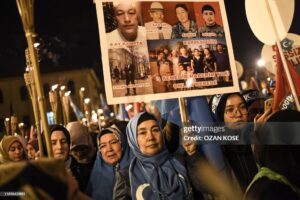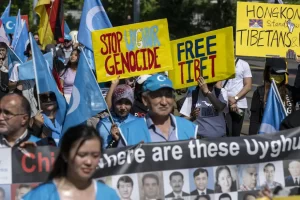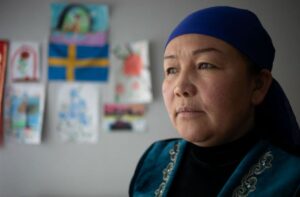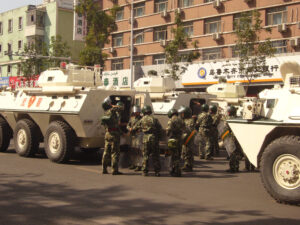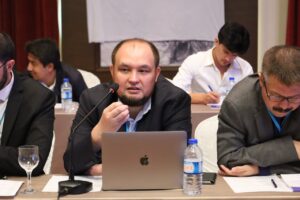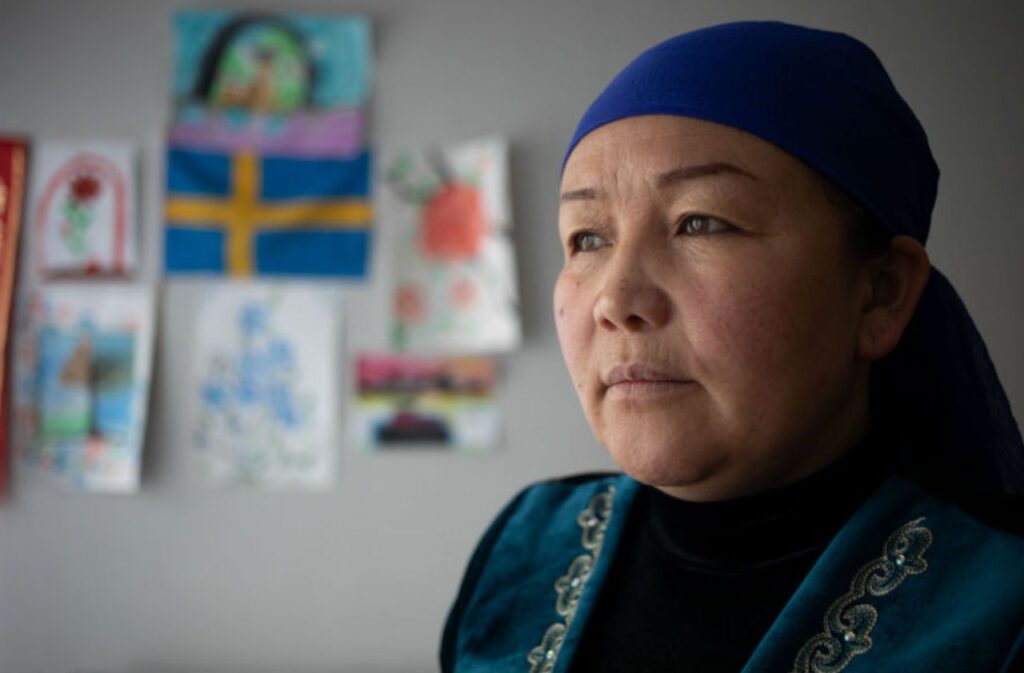
A Uyghur Muslim woman who was forced into a Chinese ‘re-education center’ so she could teach the inmates has revealed the full horror of life at the prison camp after she escaped.
Sayragul Sauytbay, 43, was forced to spend five months at one of the camps in Xinjiang province between 2017 and 2018 where she taught other prisoners Chinese as part of efforts to indoctrinate them into Chinese culture.
During her time at the camp she witnessed an elderly woman who had her skin flayed off and fingernails pulled out for a minor act of defiance, a woman who was raped in turn by guards as part of a forced confession, and prisoners who suffered memory losses and infertility after being given mysterious injections.
She described how inmates sleep 20 to a room measuring 50ft by 50ft with a single bucket for a toilet, were routinely starved aside from Friday when they were force-fed pork, and spent hours learning political slogans such as ‘I love Xi Jinping’.
‘Inmates turned into bodies without a soul,’ she said.
Sauytbay told how authorities began taking DNA samples from the Uighurs at the end of 2016, confiscated their phone SIM cards, and put up security cameras in every neighborhood.
The following year, she says she was repeatedly arrested and questioned by police over her husband and children, who were living in neighboring Kazakhstan.
Then, in November 2017, she was bundled into a vehicle and driven to one of the camps where she was made to sign a piece of paper promising to teach her fellow inmates, under penalty of death for failing to comply.
‘The document stated that it was forbidden to speak with the prisoners, forbidden to laugh, forbidden to cry and forbidden to answer questions from anyone,’ she said.
‘I signed because I had no choice, and then I received a uniform and was taken to a tiny bedroom with a concrete bed and a thin plastic mattress.
‘There were five cameras on the ceiling – one in each corner and another one in the middle.’
While her quarters were sparse, they were better than the other inmates who were shackled by the hands and feet even while they slept, and were forced to sleep on their right-hand side or else face punishment.
Punishments were carried out in a so-called ‘black room’, a nickname given to it by the prisoners because they are banned from talking about it.
Sauytbay said tortures included being forced to sit on a chair covered with nails, beatings with electrified truncheons, and having fingernails torn out.
In one case, she said an elderly woman arrived in the camp accused of talking to someone from abroad by phone – even though the woman didn’t own a phone and couldn’t use one.
When she denied her ‘crime’, Sauytbay said she was taken to the ‘black room’ and reemerged later covered in blood, with her skin flayed and her nails gone.
Outlining the average day for prisoners, she said it began at 6am with a wake-up call before breakfast of rice or vegetable soup with a small piece of bread.
After that they were taken for lessons which included learning Chinese, rehearsing propaganda songs, and repeating political slogans praising the Communist party.
After a break for lunch – another meal of soup and bread – pupils were told to ‘confess’ sins including not knowing the Chinese language or cultural traditions.
Those who failed to think of sins or invent some were punished, she said.
After dinner ‘the pupils were required to stand facing the wall with their hands raised and think about their crimes again,’ she added.
‘At 10 o’clock, they had two hours for writing down their sins and handing in the pages to those in charge.
‘The daily routine actually went on until midnight, and sometimes the prisoners were assigned guard duty at night. The others could sleep from midnight until six.’
Rape and gang rape was also frequently used as a weapon against female prisoners, with females under the age of 35 routinely taken to the guard’s quarters at night, without returning until morning.
Sauytbay said she witnessed one woman being brought back to her classroom after being gang-raped and ordered to sit down.
‘She just couldn’t do it, so they took her to the black room for punishment,’ she said.
In another horrifying episode, 200 prisoners were taken to a yard before one woman was ordered to come forward and confess her ‘sins’.
Afterwards, the guards lined up and raped her one after the other while the rest of the prisoners were forced to watch.
‘While they were raping her they checked to see how we were reacting. People who turned their head or closed their eyes, and those who looked angry or shocked, were taken away and we never saw them again,’ she said.
She described sanitation at the facility as ‘atrocious’ and said prisoners often got sick, in which case they were denied treatment – while others with pre-existing conditions such as diabetes had their medications taken away.
Instead, they were given mysterious pills and injections which guards claimed would protect them against disease and AIDS, but which Sauytbay believes was a medical experiment.
Those who were treated began suffering memory lapses, and became either impotent or infertile.
Sauytbay said she was suddenly released from the camp in March 2018 and sent home, but just three days later was accused of being in touch with someone from overseas and told she would be going back to a camp.
This time she would be thrown in with the general population, and would have to stay there for up to three years.
Convinced she would die, she fled her home and ran for the Kazakhstan border, and from there managed to reunite with her family.
She spent more than a year in the country as she tried to apply for asylum three times, but had each attempt knocked back.
In June 2018 she left for Sweden, where asylum was granted and where she now lives with her husband and two children.
Despite her newfound freedom, Sauytbay says her experience in the camp will haunt her for life. ‘I will never forget the camp,’ she said.
‘I cannot forget the eyes of the prisoners, expecting me to do something for them. They are innocent.
‘I have to tell their story, to tell about the darkness they are in, about their suffering. The world must find a solution so that my people can live in peace.’
A Uyghur Muslim Reveals the Horror of Prison Camp She Escaped in China – 21Wilberforce

